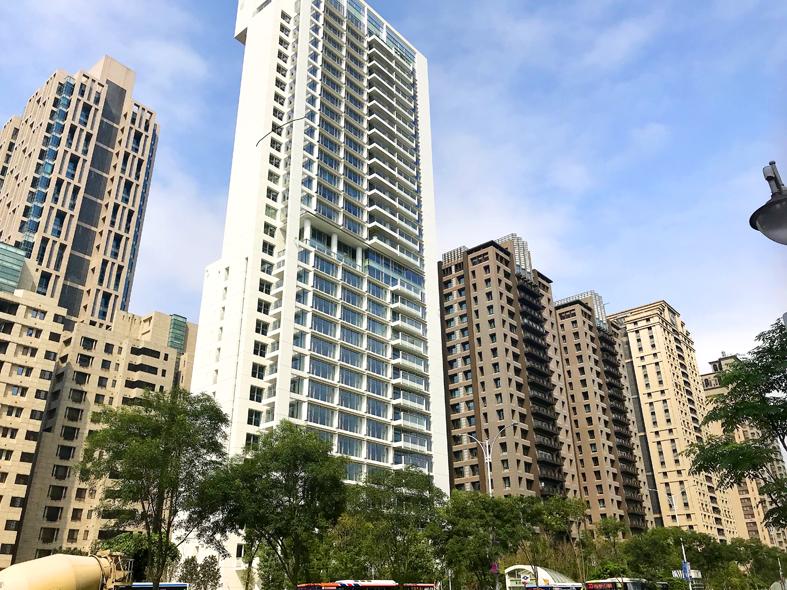Luxury home prices in Taipei last quarter jumped 18.9 percent year-on-year, the second-best performer in Asia and seventh-fastest globally, as low interest rates and a shortage of homes fueled demand, a survey released on Monday by property consultancy Knight Frank LLP found.
The London-based consultancy revealed the findings in a quarterly report showing that prime housing prices in 46 major cities around the world rose 9.8 percent from a year earlier, the fastest acceleration since 2007.
In Asia, Taipei’s increase was only surpassed by Seoul’s 20.3 percent, while Dubai topped the survey globally with a 44.4 percent advance, followed by 42.4 percent in Moscow and 28.2 percent in Miami.

Photo: Hsu Yi-ping, Taipei Times
In Taipei, presale projects accounted for most of the transactions, little affected by credit controls and unfavorable policy measures that impose punitive income taxes on contract transfers, Knight Frank Taiwan researcher Andy Huang (黃舒衛) said.
The most transactions were reported for an upcoming luxury residential complex on Dunhua N Road and a landmark presale project in Nangang District (南港), where housing prices are catching up with apartment prices in the city’s central districts, Huang said.
The hikes in upscale housing prices likely had to do with rising inflationary pressure, as various surveys have shown that Taiwanese favor real estate over other investments as a hedge against inflation, he said.
Some funds might seek shelter in real estate as Russia’s invasion of Ukraine plays havoc with global equity markets, he added.
However, central bank is due to review its monetary policy tomorrow, while the Ministry of the Interior is drafting a bill that aims to impose heavy fines on dishonest housing advertisements, Knight Frank said.
The consultancy said it expects global central banks to turn hawkish and tighten regulations this year, with the US Federal Reserve likely to raise interest rates four times, while Singapore has raised taxes for all home buyers, including developers.

RUN IT BACK: A succesful first project working with hyperscalers to design chips encouraged MediaTek to start a second project, aiming to hit stride in 2028 MediaTek Inc (聯發科), the world’s biggest smartphone chip supplier, yesterday said it is engaging a second hyperscaler to help design artificial intelligence (AI) accelerators used in data centers following a similar project expected to generate revenue streams soon. The first AI accelerator project is to bring in US$1 billion revenue next year and several billion US dollars more in 2027, MediaTek chief executive officer Rick Tsai (蔡力行) told a virtual investor conference yesterday. The second AI accelerator project is expected to contribute to revenue beginning in 2028, Tsai said. MediaTek yesterday raised its revenue forecast for the global AI accelerator used

Taiwan Semiconductor Manufacturing Co (TSMC, 台積電) has secured three construction permits for its plan to build a state-of-the-art A14 wafer fab in Taichung, and is likely to start construction soon, the Central Taiwan Science Park Bureau said yesterday. Speaking with CNA, Wang Chun-chieh (王俊傑), deputy director general of the science park bureau, said the world’s largest contract chipmaker has received three construction permits — one to build a fab to roll out sophisticated chips, another to build a central utility plant to provide water and electricity for the facility and the other to build three office buildings. With the three permits, TSMC

TEMPORARY TRUCE: China has made concessions to ease rare earth trade controls, among others, while Washington holds fire on a 100% tariff on all Chinese goods China is effectively suspending implementation of additional export controls on rare earth metals and terminating investigations targeting US companies in the semiconductor supply chain, the White House announced. The White House on Saturday issued a fact sheet outlining some details of the trade pact agreed to earlier in the week by US President Donald Trump and Chinese President Xi Jinping (習近平) that aimed to ease tensions between the world’s two largest economies. Under the deal, China is to issue general licenses valid for exports of rare earths, gallium, germanium, antimony and graphite “for the benefit of US end users and their suppliers

Dutch chipmaker Nexperia BV’s China unit yesterday said that it had established sufficient inventories of finished goods and works-in-progress, and that its supply chain remained secure and stable after its parent halted wafer supplies. The Dutch company suspended supplies of wafers to its Chinese assembly plant a week ago, calling it “a direct consequence of the local management’s recent failure to comply with the agreed contractual payment terms,” Reuters reported on Friday last week. Its China unit called Nexperia’s suspension “unilateral” and “extremely irresponsible,” adding that the Dutch parent’s claim about contractual payment was “misleading and highly deceptive,” according to a statement